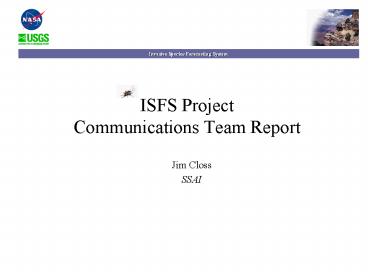ISFS Project Communications Team Report - PowerPoint PPT Presentation
1 / 8
Title:
ISFS Project Communications Team Report
Description:
Juliette Wilson, Lance Everette, USGS Fort Collins Science Center ... Upper Midwest Environmental Science Center - State of Colorado. 9/18/09 ... – PowerPoint PPT presentation
Number of Views:20
Avg rating:3.0/5.0
Title: ISFS Project Communications Team Report
1
ISFS ProjectCommunications Team Report
- Jim Closs
- SSAI
2
ISFS Communications Team Summary
- Communications Team Members - Jim Closs,
NASA/GSFC/SSAI - - Juliette Wilson, Lance Everette, USGS Fort
Collins Science Center - Michele Banowetz, USGS
Public Affairs - - Gladys Cotter, Mike Frame, Annie Simpson, NBII
- - Geneva Chong, USGS National Institute of
Invasive Species Science
3
ISFS Communications Plan Overview
- The ISFS is an important, high profile component
of the ESE Applications Program, and a valuable
tool for USGS environmental mitigation efforts.
We must demonstrate socio-economic benefits
through USGS and other partnerships. - We must engage government, education, and
professional organizations to- Leverage ISFS
initiatives- Increase awareness of the invasive
species issue- Maximize the return on our
investment- Stimulate collaboration among
partners with mutual vested interest - We do this through effective and regular
reporting on- Computational technology
advancements - - Science research findings- Decision support
accomplishments- Education initiatives
4
ISFS Target Audiences
- NASA Stakeholders- HQ Applications Division
(Code YO)- HQ Research Division (Code Y)-
EOSDIS SEEDS- EOS Clearing House (ECHO)- ESIP
Federation- ESTO Computational Technologies
Program- Global Change Master Directory - USGS Stakeholders- National Invasive Species
Council- National Biological Information
Infrastructure (NBII)- USGS Biological Resources
Division- US Department of the Interior-
National Institute of Invasive Species Science
5
ISFS Target Audiences (Cont.)
- ISFS Customers- Grand Staircase Escalante
National Monument- Rocky Mountain National
Park- Los Alamos National Labs/Cerro Grande
Wildfire site- The Tamarisk Coalition- National
Park Service- Patuxent Wildlife Research
Center- US Fish and Wildlife Service Wildlife
Refuges- Biota of North America Program- US
Forest Service Health Monitoring Program-
Long-Term Ecological Forecast Program- Colorado
Natural Heritage Program- Center for
Environmental Management of Military Lands- The
Nature Conservancy- Nature Serve- National
Wildlife Health Center- Upper Midwest
Environmental Science Center- State of Colorado
6
ISFS Target Audiences (Cont.)
- ISFS Vested Interest Partners- National Invasive
Species Council- Affiliated Universities- NASA
Earth Observatory- EOS Mission and Instrument
Teams- NSF National Ecological Observatory
Network (NEON)- NSF SPIRE Project - Professional Societies- Remote Sensing Societies
(ASPRS, AGU, etc.)- Environmental/Ecological
Societies (ESA)- Computer/Information Technology
Societies- Civic/Government organizations - Science Attentive Public
7
Outreach Products and Services
- Peer reviewed publications
- ISFS posters
- ISFS Brochure
- ISFS Web Site
- Invasive Species Visualizations
8
Communications Team Summary
- Partners Projects
- Partners USGS, NREL, NBII, US DOI, USDA, NPS,
NSF, AMNH - Projects
- Conference participation coordination
- Grand Staircase Biodocumentary (AMNH)
- Earth as Parks (National Park Service)
- Web resource coordination
- Educational/promotional literature production
- Peer Reviewed publications
Performance Schedule v Jan 04 ISFS poster
presented at ESIP Federation v Apr 04 NASA/USGS
Spotlight research article v Apr 04 V1.0 ISFS
Communication Plan Jun 04 ISFS Brochure Jul
04 V2.0 Web Site release Jul 04 ISFS
Visualizations Aug 04 ISFS Press release Aug
04 ISFS Paper and poster at ESA Conference Oct
04 Society of Environmental Journalists Dec
04 American Geophysical Union Feb 05 AAAS,
Washington, DC Mar 05 ASPRS, Baltimore Aug
05 ESA annual conference
Status Issues Diverse partners and
communities inhibit communication and
collaboration on outreach initiatives.
Insufficient predictive maps and other system
output to demonstrate real applications.
Should improve as system matures.































